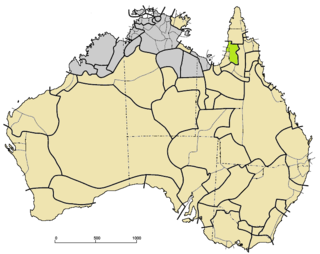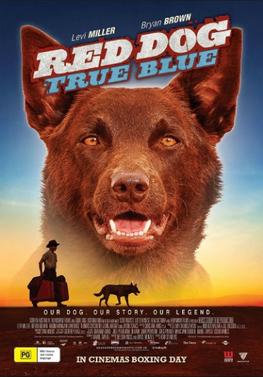
Hanabiko, nicknamed "Koko" was a female western lowland gorilla. Koko was born in San Francisco Zoo, and lived most of her life at The Gorilla Foundation's preserve in the Santa Cruz Mountains. The name "Hanabiko" (花火子), lit. 'fireworks child', is of Japanese origin and is a reference to her date of birth, the Fourth of July. Koko gained public attention upon a report of her having adopted a kitten as a pet and naming him "All Ball", which the public perceived as her ability to rhyme.
Koko or KOKO may refer to:
Djabugay is an endangered Australian Aboriginal language spoken by the Djabugay people with 46 native speakers at the 2016 census. The Djabugay language region includes Far North Queensland, particularly around the Kuranda Range and Barron River catchment, and the landscape within the local government boundaries of the Cairns Regional Council.
Yir-Yoront was a Paman language spoken in two settlements, Kowanyama and Pormpuraaw on the southwestern part of the Cape York Peninsula, Queensland in Australia, by the Yir-Yoront people. In 1991 only 15 speakers remained, with the rest of the Yir-Yoront people speaking English or even Kuuk Thaayorre as many speakers of Yir-Yoront apparently are using Kuuk Thaayorre in daily conversation. At present it is thought to be extinct. There are two sister dialects, Yir-Yoront proper and Yirrk-Thangalkl, which are very close. The shared name Yir is sometimes used for both taken together.

The Paman languages are an Australian language family spoken on Cape York Peninsula, Queensland. First noted by Kenneth Hale, Paman is noteworthy for the profound phonological changes which have affected some of its descendants.

The Southwestern Paman languages are a family of the Paman languages spoken on the western part of the Cape York Peninsula of Queensland, Australia.
The Thaayorre, or Kuuk Thaayore, are an Australian people living on the southwestern part of the Cape York Peninsula, Queensland in Australia, primarily in the settlement Pormpuraaw, having its foundation in the Edward River Mission.
Lolani Koko is a Samoan former rugby union and rugby league footballer who played in the 1980s and 1990s. He played representative rugby union for Samoa and representative rugby league for Western Samoa, including at the 1995 Rugby League World Cup.

Red Dog is a 2011 Australian comedy-drama family film written by Daniel Taplitz, directed by Kriv Stenders and produced by Nelson Woss and Julie Ryan. It stars Koko as the title character, Josh Lucas, Rachael Taylor, and John Batchelor. The film is based on the true story of Red Dog and uses the 2002 novel Red Dog by Louis de Bernières as the primary source. At the 2011 Inside Film Awards, Red Dog was nominated in nine categories and won seven, including best feature film. The film was also nominated for seven AACTA Awards and won for Best Film. The film was theatrically released on 4 August 2011 by Roadshow Film Distributors.
Gugubera, or Kok-Kaper, is a Paman language of the Cape York Peninsula, Queensland in Australia
Kok Thawa, also known as Koko Petitj, Uw Inhal, or Ogh Injigharr, is a Paman language of the Cape York Peninsula, Queensland in Australia.

Koko was an Australian canine film actor and fundraiser, an Australian Kelpie who was best known for his role as Red Dog, the title character of the 2011 film Red Dog. He was owned by Nelson Woss, a producer of Red Dog.

Red Dog: True Blue is a 2016 Australian family comedy film directed by Kriv Stenders, written by Daniel Taplitz and starring Jason Isaacs, Levi Miller and Bryan Brown. It is a prequel to the 2011 film Red Dog, detailing the early days of the Red Dog, the Pilbara Wanderer.
The Olkolo or Koko-olkola' are an Indigenous Australian people of central and eastern Cape York Peninsula in northern Queensland. According to Norman Tindale, they are to be distinguished from the Kokangol, higher up on the Alice River watershed.
The Kokangol (Koko-Gol), or Yuwula, are said to have been an Indigenous Australian people of Queensland. Some dispute this, suggesting the name may be a synonym for Aghu Tharnggala, or may simply be the name of a language consultant.
The Muluridji are an indigenous Australian people of the state of Queensland.
The Yungkurara were an indigenous Australian people of the state of Queensland.
The Kokopera, also written Koko Bera, are an indigenous Australian people of the Cape York Peninsula of Northern Queensland.
The Kokomini (Gugumini) are reported to have been an indigenous Australian people of the state of Queensland, though some indications suggest the term may refer to a loose confederation of tribal groups.
The Koko Njekodi (Guugu-Nyiguudyi) were an indigenous Australian people of Northern Queensland.





